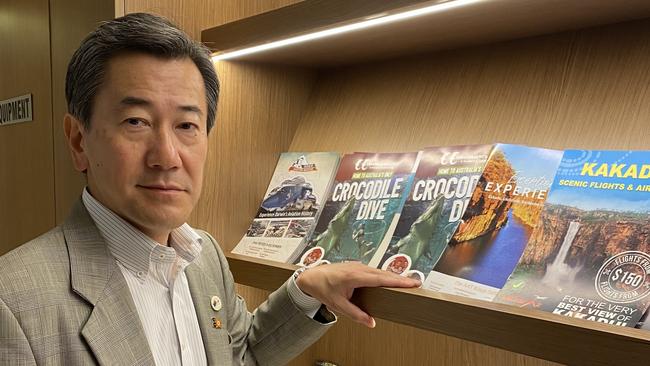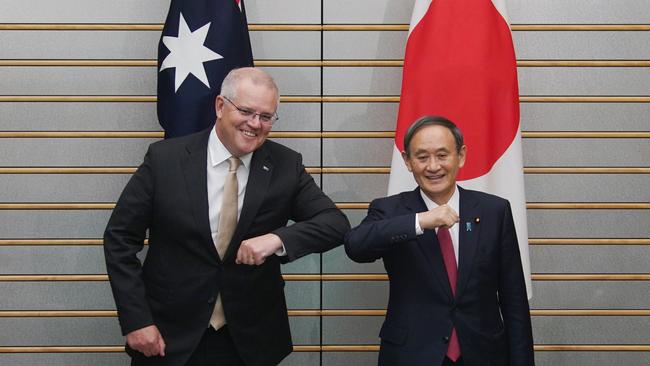Security co-operation ‘vital to counter China’, says Japanese ambassador
Japan’s new ambassador has praised the Morrison government’s strategic approach to the South China Sea.

Japan’s new ambassador has praised the Morrison government’s strategic approach to the South China Sea and declared expanding Australian-Japanese security co-operation was important because of concerns about “reckless behaviour” towards Taiwan.
Ambassador Shingo Yamagami said security co-operation, as a “relatively new and fast-growing pillar” of relations, was becoming even more important for peace in the Indo-Pacific.
As China threatens Taiwan and proposes to build a new $39bn city with a major seaport, industrial area and free-trade zone on Papua New Guinea’s south coast, just kilometres from Australian territory, Mr Yamagami said co-operation on investment in Pacific nations was vital.
Mr Yamagami, as a former head of the Intelligence and Analysis Service of the Japanese Foreign Ministry, also expressed profound appreciation for Australia’s co-operation on intelligence while there are accusations in China that the Five Eyes intelligence group — Australia, the US, the UK, Canada and New Zealand — is an “axis of white supremacy”.
“The situation surrounding Taiwan remains a bilateral and international concern because any reckless or coercive action there could gravely affect the peace and stability of the entire Indo-Pacific region,” Mr Yamagami said in an article in The Australian.
“This increases the importance of Australia and Japan working together in the East China Sea in addition to our joint efforts in the South China Sea,” he said.
Mr Yamagami said Scott Morrison’s visit to Tokyo to see the new Japanese Prime Minister, Yoshihide Suga, despite the need for a two-week quarantine, helped the great asset of mutual trust between Australia and Japan.
“Australia and Japan are natural partners since we share not only basic values such as democracy, a market economy, respect for human rights and the rule of law, but also strategic interests in maintaining a free and open Indo-Pacific region.

“Joint exercises and the transiting of the South China Sea are some great examples of this partnership,” Mr Yamagami said.
“Security co-operation, for example, is a relatively new and fast-growing pillar in the relationship.
“Australia and Japan also co-operate in the East China Sea to prevent any ship-to-ship transfer in contravention of UN Security Council resolutions regarding nuclear weapon and missile development by North Korea,” he said.
Japan also welcomed Australia’s participation in the four-way military exercises involving Japan, the US, Australia and India as part of the expansion of the trilateral security agreements to quadrilateral agreements including India.
“Japan is delighted that Australia participated in the Malabar maritime exercises with India, US and Japan last year for the first time in 13 years,” Mr Yamagami said.
Chinese diplomats in Australia have recently called on the Morrison government to “abandon ideological principles” and treat China with more respect as Chinese companies seek to spread more influence and projects into the South Pacific.
The Prime Minister described the plan for the $39bn Chinese controlled free-trade zone in PNG as “highly speculative”.
Mr Yamagami said the days of scepticism about investment from Japan was “long gone” and the Japanese government, Japanese banks and businesses were keen to support building projects in the region and promote investment in low carbon emissions technology in Australia.
“The possibilities for Japan and Australia to co-operate on emerging low-emissions energy technologies are endless. We are also stepping up co-operation with Indo-Pacific countries.”






To join the conversation, please log in. Don't have an account? Register
Join the conversation, you are commenting as Logout